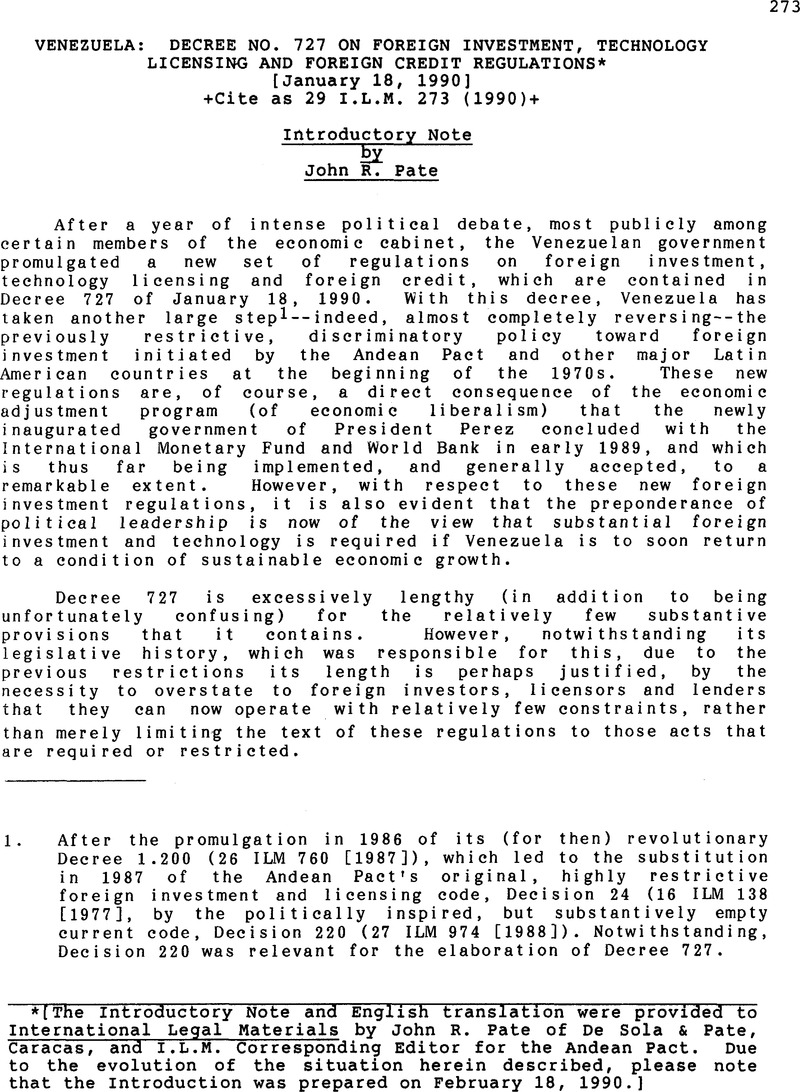No CrossRef data available.
Article contents
Venezuela: Decree no. 727 On Foreign Investment, Technology Licensing And Foreign Credit Regulations
Published online by Cambridge University Press: 27 February 2017
Abstract

- Type
- Legislation and Regulations
- Information
- Copyright
- Copyright © American Society of International Law 1990
References
* The Introductory Note and English translation were provided to International Legal Materials by John R. Pate of De Sola & Pate, Caracas, and I.L.M. Corresponding Editor for the Andean Pact. Due to the evolution of the situation herein described, please note that the Introduction was prepared on February 18, 1990.
1 After the promulgation in 1986 of its (for then) revolutionary Decree 1.200 (26 ILM 760 [1987]), which led to the substitution in 1987 of the Andean Pact's original, highly restrictive foreign investment and licensing code, Decision 24 (16 ILM 138 [1977], by the politically inspired, but substantively empty current code, Decision 220 (27 ILM 974 [1988]). Notwithstanding, Decision 220 was relevant for the elaboration of Decree 727.
2 It may be noted, however, that this decree would appear to have excluded certain activities, such as the merchant marine and cabotage, that are reserved by sectoral laws to majority national investment. These laws generally predate the era of restrictive foreign investment norms and are not legally modified by this new decree, by virtue of being hierarchically superior “laws” rather than mere executive “decrees”.
3 See generally Chapter X of Decree 727. However, note the contradiction between Article 44 (new foreign investment to avoid bankruptcy) and Article 58 (capitalization of foreign loans ).
4 It may be observed that as of mid-February 1990 it appears that the opening to foreign investment may go even further in the relatively near future. The liberal reformers and proponents of this opening of the economy are advocating permitting a significant role for foreign investment in the banking and insurance sectors, and President Perez is promoting the reentry of foreign oil companies into basic hydrocarbon activities.
5 The principal motive for this change is that the Ministry of Industry and Commerce is now to concentrate on promoting investment and development, rather than being the agency primarily responsible for intervening in and policing the private economy as in the past. However, as a footnote to history it may be observed that in the political struggle over the orientation of the new foreign investment policy the Minister of Finance and her collaborators were in favor of maintaining controls over and restrictions for foreign investment whereas the Minister of Industry and Commerce and his collaborators form part of the liberal group within the government.
6 For the legislative history of the adoption of Decision 220 by Venezuela, see my Introductory Note at 27 ILM 974-976 (1988). In brief, although under international treaty law and Venezuelan constitutional law Decision 220 should have automatically entered into effect in Venezuela when it was approved by the Andean Pact Commission, due to the sensitivity of any liberalization of the foreign investment policy in Venezuela it was decided for political reasons to have the congress expressly ratify Decision 220, for which reason Decision 220 was not considered to have officially entered into effect in Venezuela until a year later than in the other Pact countries.
* Translator's note:should read “Articles 76 and 77”.
* Translator's note:should read “Article 62”.




